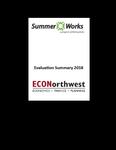As SummerWorks enters its tenth year of placing Portland-area young adults in summer jobs and internships, a recent study conducted by EcoNW shows that program participants achieve greater academic and workforce success.
Launched in 2009 in response to the youth unemployment crisis caused by the Great Recession, SummerWorks has placed over 7,000 young people, ages 16 to 24, in summer jobs.
Despite the economic turnaround, regional youth continue to face significant challenges. Youth unemployment in the County remains stubbornly high at nearly 13%. More than 16,000 young people between the ages of 16-24 in Multnomah and Washington counties are neither connected to school or work. Nearly 20% of the region’s students do not graduate from high school in 4 years and this number is significantly higher for low-income students and young people of color.
SummerWorks helps bridge the economic and academic divide by providing a first job experience for young adults who are motivated to work but lack the social networks or support to find jobs on their own. The program targets under-represented youth who face challenges such as growing up in poverty or being at-risk of dropping out of high school, and places participants into meaningful work opportunities they likely would not have had access to without the program. In addition, SummerWorks provides work readiness training, job coaching and other support services to promote program success and encourage ongoing engagement in school and work.
The EcoNW report summarizes findings from an assessment of SummerWorks participation between 2009 – 2016. The analysis showed:
- SummerWorks participants had better than predicted academic outcomes, especially among participants from communities of color.
- SummerWorks enrolls a much higher share of people of color than the region overall – 71 percent of participants identified as a person of color compared to 41 percent of all students in Multnomah and Washington counties.
- High school youth returned to school at higher rates than expected.
- SummerWorks participants enrolled in postsecondary programs at a much higher rate than their peers (65% vs 52%).
- 70 percent of high school graduates and 72 percent of non-graduates either continued their education or engaged in work the year following participation.
- High school students age 16 through 18 who returned to school and worked in the year following participation had higher median wages than their non-participant peers across the Portland metro region ($8,404 vs $2,105).
“The success of the SummerWorks program shows that a long-term commitment to workforce development has greater impacts to our community than just summer jobs,” says Andrew McGough, Executive Director of Worksystems, Inc. “Engaging young adults in programs that increase their participation in school and earning potential helps create a stronger economy for the region.”
Initial funding for SummerWorks came from the American Recovery and Reinvestment Act (ARRA) in 2009. Since then, more than 40 investors have contributed to the program’s success, the largest being Multnomah County and the City of Portland. Other investors include, the Department of Human Services, Washington County, Tri-Met, JP Morgan Chase and several other regional companies.
“This study proves that by working together we can make a real difference for the region’s youth and economy,” says Norm Eder of Manufacturing 21.


